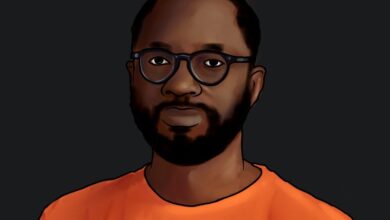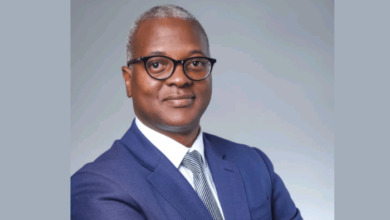The Lunch Hour – Austin Okere, Founder, Computer Warehouse Group Plc

Mr. Austin Okere studied Computer Science at the University of Ghana, Legon and the University of Lagos, Akoka. He worked with Inlaks Computers for four and half years before founding the Computer Warehouse Group (CWG). CWG Plc was listed on the Nigerian Stock Exchange in 2013 as the largest security in the technology sector. He now devotes his time to nurturing entrepreneurs and Business Leaders, optimizing their businesses for geometric growth through the Platform of the Ausso Leadership Academy which he founded in 2018. He has been an Entrepreneur-in-Residence at Columbia Business School, New York since 2007. He is a member of the World Economic Forum Business Council on Innovation and Intrapreneurship. He has been appointed to the Advisory Board of the Global Business School Network in Washington DC in recognition of his major contribution to the development of business education and knowledge transfer in Africa. Austin has taught at the United States International University (USIU) in Kenya and has served as a Consultant to the Sustainable Development Goals, African Center (SDGAC) in Rwanda. Austin serves on the Board of Trustees of the Risk Management Association of Nigeria RIMAN and is a Non-Executive Director at Globus Bank.
“There is nothing wrong with working hard, making money and enjoying it. But there is everything wrong with greed, with embezzling money meant for the commonwealth and dumping it in a Swiss bank or in properties that are locked up in Dubai or the United Kingdom”.
Your Course of Study at University?
A then new science, Computer Science
Do you remember what led to the choice?
I was just reading an old article I wrote about making lemonade with lemons. I attended St Augustin Secondary School in Cape Coast Ghana. I was actually born in Ghana. My mother is Ghanaian, my father Nigerian. I did very well in my O Level examinations. But I did very poorly in my A Level perhaps because I was over confident and unfocussed. I chose medicine and engineering when applying to the university but I was not accepted. However, there was a new course called Computer Science. After I dabbled for a short period at the Department of Agriculture with low interest, the Dean advised me to try Computer Science. I went to the Computer Science Department and I was accepted. I do not think it was because of any brilliance. The course had just started in Ghana in 1982 and they were even admitting people straight out of O Levels. They did not require an A Level result. There I was sitting in class with people two years my junior. But I swallowed my pride and took to it like fish to water. I was not too regretful, as it helped greatly in starting the Computer Warehouse Group (CWG) and it later became the largest security in the technology sector of the Nigerian Stock Exchange. So you see how we can make lemonade with lemons. I had to transfer from the University of Ghana to the University of Lagos after my first year because Jerry Rawlings took over power in Ghana and the schools were shut for a long time when students started rioting. I finished at the University of Lagos with a Second-Class Upper Division degree which I was very happy with, given where I was coming from.
What lesson did you leave the University with?
I think there are two lessons for me. First, remain humble, do not let success turn your head. I did very well in my O Level. I made five A1s. Remain humble and remain hungry. The second is that nobody can go back and rewrite the beginning of a book but you can always write the ending. Starting from where I found myself, I wrote an entirely new chapter. Remember to always keep your feet to the ground. If you make a mistake, it is not the end of the world. Refocus and try again, mistakes are part of learning.
And the biggest lesson from your first job?
My first job after I graduated was my NYSC engagement at the Nigerian National Petroleum Corporation (NNPC). I was posted to the ETSD, the Engineering and Technical Services Department at Falomo. The lesson from my time there is that wherever you find yourself, do not underestimate your potential, even with humble beginnings. Don’t think you are insignificant and so your views and your effort do not matter. Put in your best and maybe someone will notice your good work. I was working as if it was a permanent job rather than an NYSC posting. My boss at the time, Ms. Laura Ezekwe, was indeed watching. As a youth corper, I was sent on an assignment to Ahmadu Bello University, Zaria. The university was one of the very few at that time that had the statistical package SPSS. We were trying to analyse the survey that we had done on petroleum and diesel pricing. We needed to use SPSS to analyse the data and crunch it into meaningful information. I carried trunks boxes of documents to Zaria to run on their computers.
Also Read: The Lunch Hour – Owen Omogiafo, CEO, Transcorp Group Plc
We spent two weeks feeding the data into the system and coming up with recommended prices for the products. The ETSD later became the Petroleum Products Pricing Regulatory Agency (PPPRA). I was a youth corper on tour, staying in a hotel and getting travel allowance. A lot of people were like, how come a youth corper is going on tour, but you could not argue that it was based on merit. It is always important to show up at your best and do so consistently no matter the circumstances, or how small or big you are in the organization.
So you ended up working in the NNPC for a while?
There is another lemon story here. With all I did at the NNPC I thought I would be automatically retained, so I did not put in too much effort to look for other job options. But I was told that there is a quota for every state. There was something called federal character. Imo State quota was filled. That was a big learning point for me. Do not plan one future, plan many futures. I started to look for a job and I got to the final interview at two companies, Shell and a company then called Arthur Andersen. I had my last interview at Arthur Anderson with a partner called Toyin Munis who told me that I just needed to meet another Partner and thereafter I could start. I was sure I had gotten the job. I got to Arthur Anderson as early as 7:30 a.m. but the Partner did not see me until about 4:30 p.m. He asked about two or three questions. I cannot remember the questions but the long and short is I got a rejection letter and my world turned upside down. Life is full of lemons. I met him ten years later while he was consulting for a project. CWG was one of the technical partners being considered. I asked him after our interaction if he remembered a young man he interviewed ten years ago. “You asked me just two questions” and bounced me. He laughed and asked me “if I had hired you, would you be where you are today?” We both laughed about it – you know what? He was right!
Your best boss ever?
My first job after youth service was with Tritech. I had a boss called Fola Awokoya, who taught us about the rudiments of business. He taught us how to dress, how to appear at a client’s site. He was a Harvard Graduate. He taught us a lot. He told us -do not wear multi-colored shirts to the office. He gave us the freedom to grow. I learnt to take initiative, not wait for someone to tell me what to do. Perhaps my most significant boss was my last; Pramode Metre was an embodiment of business and cognitive intelligence. He was the General Manager of Inlaks Computers, the company I joined after about a year at Tritech. I was there for four and a half years and rose very quickly to become Sales Manager. I adopted him as my mentor. He also liked me so much. He taught me the rudiments of business discipline and spotting and honing an idea into a viable revenue stream. He took me under his wings because he saw potential in me. If one is open to learning, you get to learn a lot. So, I will say Pramode impacted me significantly in my business journey. He lives in the USA now and we are still very much in touch.
What do you look for when you are hiring candidates?
My golden rule is to hire for character and train for competence. Because we believe that we can shape the candidate to acquire professional knowledge to any level but character defines one, and you cannot train people to have it. We look for people who share the values of integrity, excellence, and commitment.
And what have you learnt about motivating people?
Working with people to help them find their passion zone. Everyone has one. If you take Chinua Achebe, Wole Soyinka or Chimamanda Ngozi, their passion is telling stories. Usain Bolt’s passion is running, Obama’s is organising. Once you get into that passion zone, you will fly. That’s my experience and this insight has helped me motivate people. My passion zone once was building a source of productive, stable and sustainable wealth. That is how I built a quoted company. But where I am now, what I am consumed with is a passion to enable shared prosperity. There is more to life than building wealth and it is helping others to build productive and sustainable living in society. The goal is to achieve shared prosperity with a solid and sustainable base amongst as many people as possible. I realise the entrepreneurs and family businesses are the backbone of our economy. Without the right handholding, many of them perish after the founder bows out. The best way to help them is to provide them with the models and frameworks for success. This is what we do at the Ausso Leadership Academy. So far, over 1,000 people and over 60 companies have been impacted . That is the vision behind the Ausso Leadership Academy (ALA), which we started in 2018. The vision is to enable an expanding oasis of outstanding businesses. When these businesses succeed, they will employ more people, if they employ more people, what results is shared prosperity. While I was the architect of the Platform, the achievement has been a collective effort. The faculty consists of Business Leaders and Entrepreneurs with practical experience and proven track record, imparting knowledge through experiential learning. They are complemented by Champions of Business and Entrepreneurship who come to share the stories of their journeys and how they overcame adversities in building their businesses.
Also Read: The Lunch Hour – Olu Akpata, Partner, Templars Law Firm
Who are your favourite authors?;
When I was developing in my professional career, I read Tom Peters’ In Search of Excellence. It is a fantastic book for a developing business mind. I also read a lot John Maxwell’s books. He is a great coach. I read a lot of biographies and autobiographies. One that I cannot forget is The Magic of Thinking Big by David Schwartz. Another good one is The Bestseller by Brian Tracy. Books open our minds. They are an inspiration to aim to do the great things great people have achieved and to even try and surpass their achievements. They also teach us to avoid the mistakes they made. I encourage young business people to find the time to read as widely as possible. You will end up knowing a little about a lot of things and the knowledge will always be useful.
What is the best use of money to you?
Just this morning, I was speaking with my wife, recalling a time when we used to collect bottle tops as children. We also played games with them. I had won so many bottle tops, I had them in sacks. It was exciting winning them. But one day I was wondering what was the point of my huge collection of bottle tops? I came to regard the pile as worthless. I have developed a similar attitude to money. If the money is not doing any good, I see no reason for it. You find people with billions and still amassing more billions. There is nothing wrong with working hard, making money and enjoying it. But there is everything wrong with greed, with embezzling money meant for the commonwealth and dumping it in a Swiss bank or in properties that are locked up in Dubai or the United Kingdom. If you look at people that make good use of money, if you look at families that have set up foundations to help society such as the Ford foundation, Bill Gates Foundation, and what they put money in, it is of great benefit to society at large; each of us can contribute in our own little way. We need to get to that point where we say ok, I have arrived at the top floor, now let me send the elevator back down to bring other people. Let us all share prosperity. In my view, it is better to have sustainable shared prosperity than to have a few people clutching all the wealth. That is the magic of western societies- there is a rich pool of middle-class people whose income and spending support millions of jobs. No matter how rich you are you cannot eat more than three meals a day or drink the wine a hundred people would drink. A candle losses nothing by lighting other candles. It only makes the room brighter for All”
What type of music do you like?
I listen to all sorts of music. My children are often surprised that I know the music they know. My father was in broadcasting. He used to be with the Ghana Broadcasting Corporation. Before he went into the television section, he spent quite some time spinning records on the radio. We had a lot of records in the house. I listen to Fela, I listen to Marvin Gaye, I listen to Asa. I listen to everything so far as the music is good even if I do not understand the language. I really love Ghanaian highlife.
Where do you like to spend your holiday in Nigeria and abroad?
My holidays are usually outside Nigeria. But when I started my career I used to go to Abuja for holidays because I found the Hilton Hotel, now Transcorp Hilton, to be a very serene place. It was always incredibly quiet. It was not so busy then. I loved Abuja. I have spent several holidays in the city. I took my kids for Christmas. I also like spending time in Ghana. But when I travel abroad, I prefer to go to Europe rather than America. I arrive at London and then I might go to Paris, Prague, or just anywhere I can get new experiences. I used to also go to South Africa a lot before Nigerians became targets.
If you were to run into President Muhammadu Buhari while you are on holiday, what would be the single most important thing you would ask him to do for the economy?
When I cast my mind back to when I first came to Nigeria, we had about 400,000 telephone lines and that was it. We could not do anything beyond those telephone lines. When Obasanjo liberalised the telecommunications sector in 1999, we suddenly had over a million sim cards and now have over 250m connected mobile GSM lines. Look at the boom in E-Commerce, FinTech, and many technology-enabled businesses that we could never have dreamt of. Where did Paystack come from, Flutterwave, CWG amongst others? All this progress is because we opened up the telecommunications sector. I think the next sector that needs to be focused on is the power sector. If we replicate what was done in the telecommunications sector in the power sector, I think the multiplier effect would be even greater than the breakthrough we had after we did telecommunications sector reform. And it is doable. You cannot do 50 things simultaneously, but focus on power and solve power and then also security.






